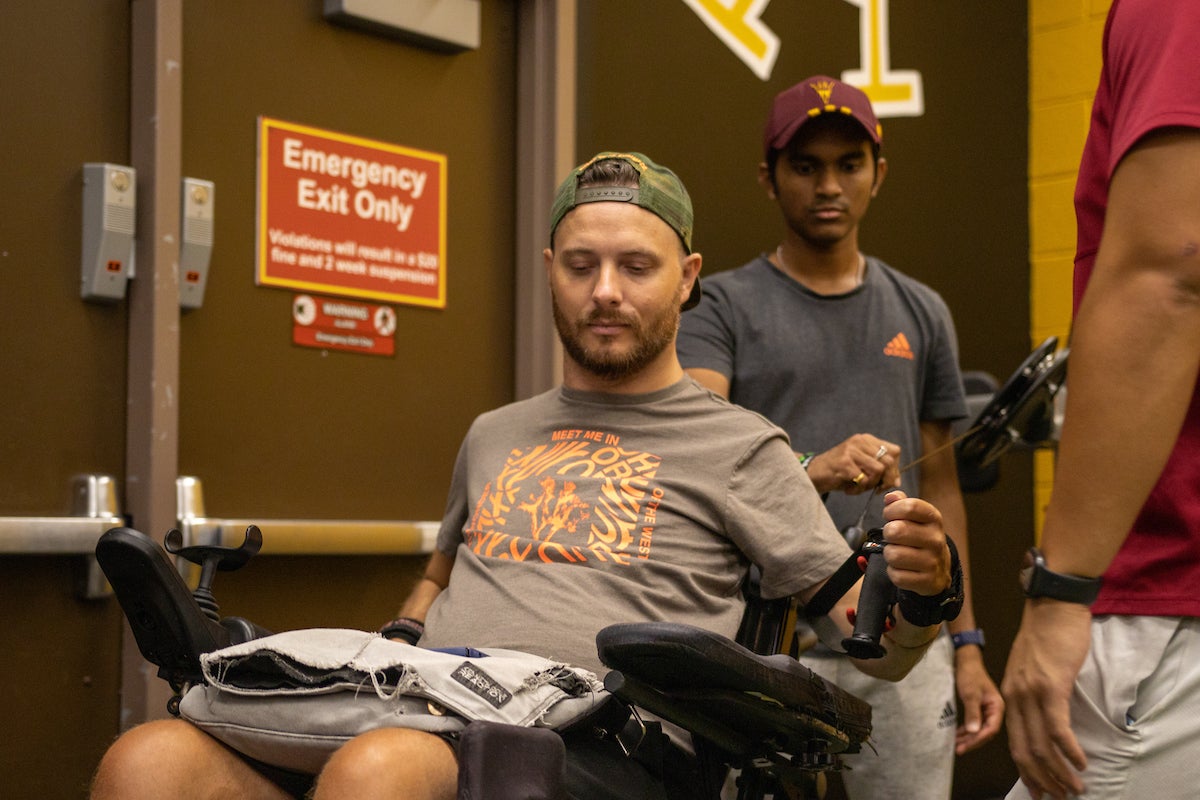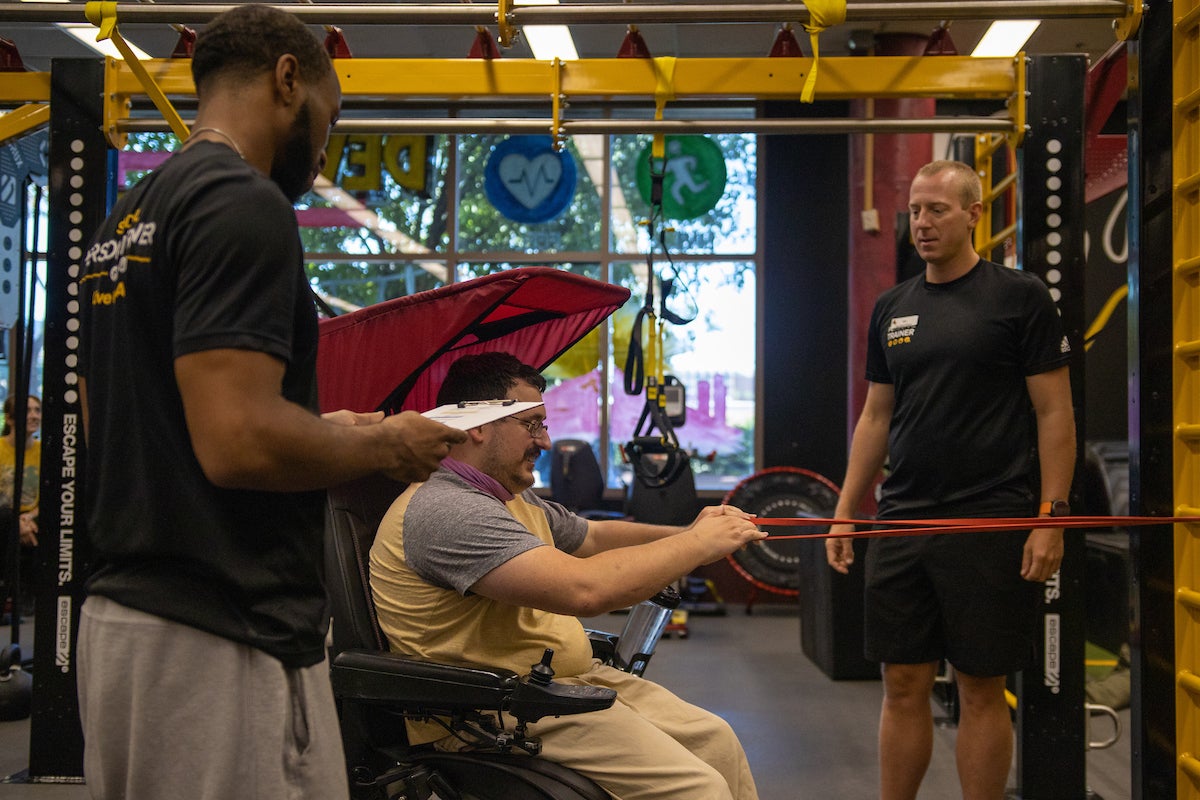Daniel Wu used to ride motorbikes as his primary mode of transportation around his home country of Taiwan. He used the bike to get to and from neighboring towns and cities through narrow, mountainous roads until about six years ago, when he was in a near-fatal accident.
Wu could not walk and broke many bones, but since he was in such a rural part of the country and did not need life support, medics and physical therapists came to his home. They returned daily for hours to work to rehabilitate Wu back into walking shape.
“It took me one to two years to get over the PTSD of motorbikes,” he said. “But today, I don’t need physical therapy. They helped me walk again.”
Wu, who is studying kinesiology at Arizona State University’s College of Health Solutions, was so inspired by his life-changing accident that he wanted to help others in the same way.
“The experience made me what I am,” he said. “I was grateful that these people fixed me. I gave up, but they kept on encouraging me to live. I don't want to be a great man like George Washington, but I want to let the world know that Daniel can help. Because I am still alive, I can change the world a little bit.”
Wu is doing just that as a trainer for Devils Adapt, a 12-week training program for adaptive athletes.
The student-led program aims to improve participants’ physical strength and mobility, and shift their mental fortitude and confidence. The group meets three times per week for scheduled workouts in the Adaptive Training Zone at ASU's Sun Devil Fitness Complex, a private training space on the Tempe campus designed for people with physical disabilities that provides an array of adaptive equipment.
The athletes who participate in the program are either ASU students or community members, while trainers are typically students from the College of Health Solutions. However, student coaches can join the program regardless of their major.
Ashley Campbell, program coordinator for the Sun Devil Fitness Complex on the Tempe campus, directs Devils Adapt and said it speaks directly to ASU’s mission of inclusivity.
“We've had students switch their majors after doing our program,” she said. “But in this role, my main goal is to try and increase the wellness of all students on campus, including anyone who identifies as an adaptive person,” she said. “We educate our trainers to address athletes as they choose to identify with their disability, as a whole person.”
Campbell and her team have ongoing strategic dialogues with the newly-founded Accessibility Coalition, which works as a governing body to represent students with disabilities across all four campuses and ASU Online.
Garrett Tanner, who is studying digital marketing at the W. P. Carey School of Business and plans to minor in disability studies, currently leads the Accessibility Coalition and is one of the group’s founders. This is his first semester as a participating athlete with Devils Adapt.
“The coalition itself is kind of the umbrella for all the other organizations and we’re a unifying force,” he said. “The whole point was to break barriers and get the disabled community a place even outside of this room (the Adaptive Training Zone).”
ASU student Garrett Tanner completes his first Devils Adapt workout during fall 2022. Photo by Christopher Goulet/ASU News
Emily Bailey, adaptive and inclusive recreation coordinator at the Sun Devil Fitness Complex, is one of the many student trainers making that difference.
“Devils Adapt values the physical training aspect of the program, but more importantly, the sense of community that comes along with it,” said Bailey, who is studying kinesiology within the College of Health Solutions and will graduate in December. “Being a trainer, it's really cool. You get that one-on-one personal experience with your athlete, but I think more of the community building aspect is what I really like most. We don't just come here, work out and leave. We're also kind of like a family in a sense. I love that.”
Many of the 2022 participants shared similar sentiments about the Devils Adapt program. In addition to the scheduled workouts, the group meets for events outside of the gym, such as rock-climbing, bowling and escape rooms.
David Jaulus, a fourth-year justice studies PhD candidate and graduate teaching associate within the School of Social Transformation, knows a thing or two about the bonds formed between Devils Adapt athletes and trainers, as this is his third full semester participating as an athlete.
“We provide an emotional support system for each other that ... you don't necessarily understand until you're a part of it,” he said. “I would encourage everyone, whether they're able-bodied or not, to be a part of this program.”
David Jaulus, a fourth-year justice studies PhD candidate, trains during a Devils Adapt workout this fall. Photo by Christopher Goulet/ASU News
At the end of the semester, the group celebrates everyone’s accomplishments with a graduation ceremony and trip, which Campbell admitted was tough to do during the pandemic when many in-person activities, especially gyms, were closed.
“2020 was a very small class. I think at the time we only had three athletes, but we had five or six trainers,” she said. “Going through that adversity and still being able to push through shows that we can get through anything.”
Campbell says teamwork, resilience, adaptability and giving a voice to the community has been key to the program’s success.
“It’s vital to give power to the communities that we want to uplift. That's how we’re going to make the most difference.”
To join an upcoming class of adaptive athletes or training staff, fill out the interest form here. Staff positions include adaptive trainers, head coach and adaptive recreation coordinator. Internship opportunities are also available through the College of Health Solutions.
Top image: Devils Adapt athlete Kyle Meyers works out with his trainer Daniel Wu in the Adaptive Training Zone at Sun Devil Fitness Complex in Tempe during the group's first workout of the fall 2022 semester. Photo by Christopher Goulet/ASU News
More Health and medicine

New initiative aims to make nursing degrees more accessible
Isabella Koklys is graduating in December, so she won’t be one of the students using the Edson College of Nursing and Health Innovation's mobile simulation unit that was launched Wednesday at Arizona…

Reducing waste in medical settings
Health care saves lives, but at what cost? Current health care practices might be creating a large carbon footprint, according to ASU Online student Dr. Michele Domico, who says a healthier…

ASU offers bilingual counseling to Spanish speakers
Arizona is one of the five states in the nation with the highest percentage of Hispanic residents, according to the U.S. Department of Health and Human Services Office of Minority Health, and …











